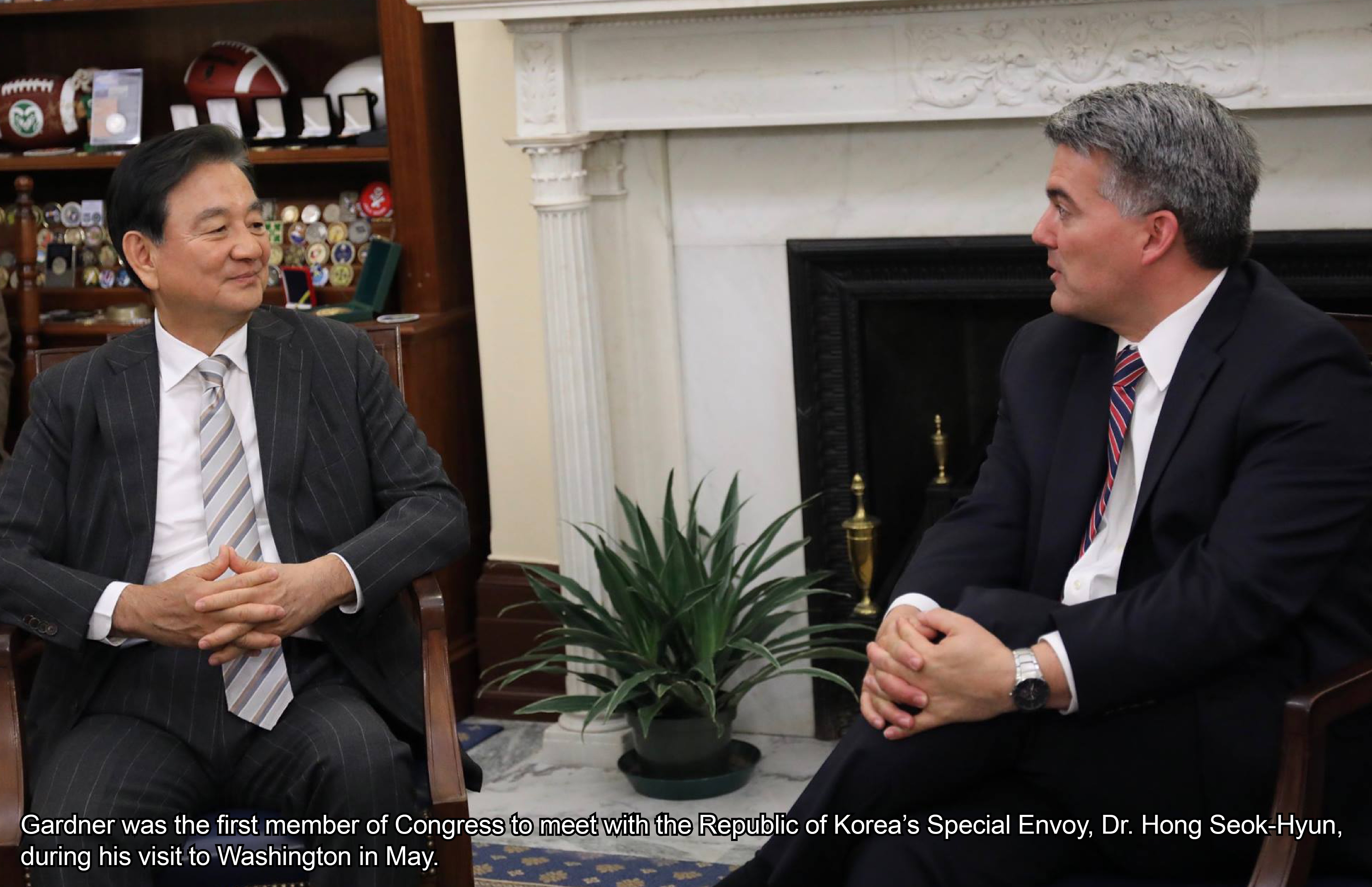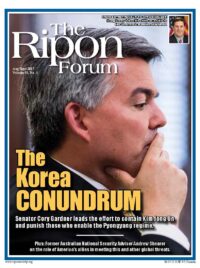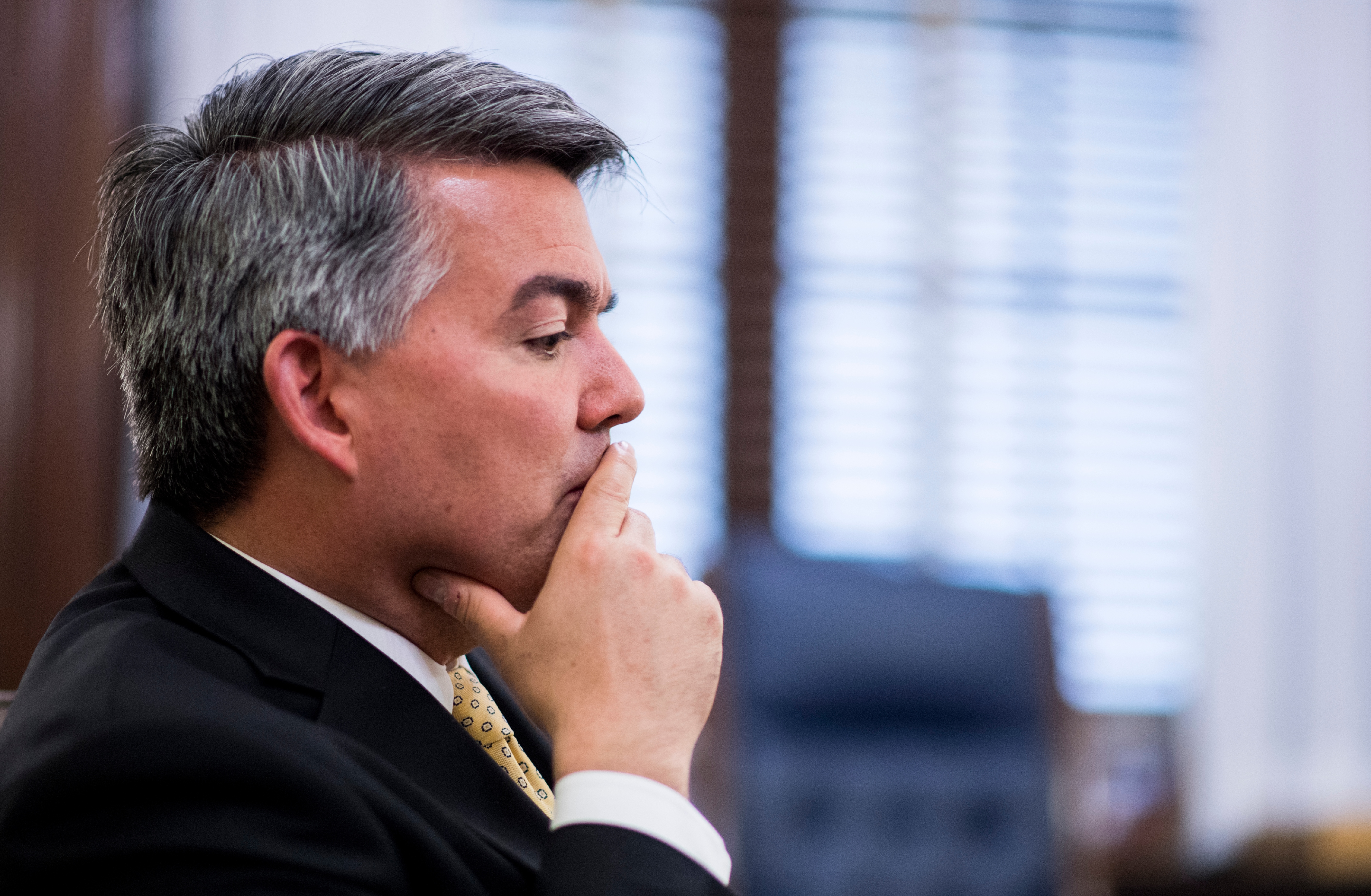Q&A with Senator Cory Gardner
U.S. Sen. Cory Gardner (R-CO) is known as one of the most optimistic men in Washington. Yet as George Will once wrote of Ronald Reagan, there is “steel behind his smile.” Nowhere is this more apparent than in the area of foreign affairs.
Gardner serves as Chairman of the Foreign Relations Subcommittee on East Asia, the Pacific, and International Cybersecurity. In the two years he has served in this role, he has become a leading voice in the effort to contain Kim Jong Un and move beyond the “strategic patience” that has defined U.S. policy toward North Korea over the past several years.
In 2016, Gardner authored the North Korea Sanctions Policy and Enhancement Act. Signed into law by President Obama, the legislation marked the first time Congress imposed stand-alone mandatory sanctions on North Korea. He followed this up last month by introducing the North Korean Enablers Accountability Act, a bipartisan measure that would ban any entity that does business with North Korea or its enablers from using the U.S. financial system.
Gardner chaired a hearing on the issue on July 28th, calling North Korea “the most urgent national security challenge for the United States and our allies in East Asia.” His call to action has not been limited to the halls of Congress. He traveled to Southeast Asia as part of a delegation led by John McCain earlier this summer, and traveled to the Republic of Korea, Burma, Singapore, Taiwan, and Japan for meetings with government officials in June of last year.
The Forum recently asked Gardner to talk about his travels, what he is hearing from our allies, and the challenges facing America not only in the Asia Pacific region, but in other regions of an increasingly volatile world.
__________________________________
RF: The world is perhaps more volatile today than at any time since the end of the Cold War. In your travels to other countries and in your meetings with our allies over the past year, what message have you been hearing, and what message have you been trying to convey?
CG: As Chairman of the Subcommittee on East Asia, the Pacific, and International Cybersecurity I’ve been deeply involved with the developing situation on the Korean Peninsula. In my meetings with military and government leaders from South Korea, Taiwan, and Japan there’s a consensus of finding a solution together that stops Kim Jong Un from starting a nuclear war.
“The situation now is at its most unstable point since the armistice but these nations are still looking to the United States for leadership.”
It’s clear the situation now is at its most unstable point since the armistice but these nations are still looking to the United States for leadership. I’m continuing to reiterate our support for them and letting them know that this situation will not be solved by just one of us. It’s going to take all of us along with China to stop the North Korean regime.
RF: Congress just approved legislation that includes a new round of sanctions aimed at North Korea. What additional actions do you believe the President should take to contain this growing threat?
CG: The administration has taken some positive steps in trying to rein in North Korea’s nuclear program. They’ve accomplished what previous administrations were unable to do in getting nations that rarely see eye to eye on anything to come together at the United Nations to put in place needed sanctions against North Korea. Recently, I also applauded the Administration’s decision to impose long-overdue sanctions on Chinese and Russian entities that had been aiding North Korea’s economy.
While these were important moves, we need to do more – much more – in imposing penalties on all North Korean enablers, no matter where they are based. We must give every entity doing business with Pyongyang a choice – you either do business with this outlaw regime or the world’s economic superpower. I have introduced legislation that would ban any entity that does business with North Korea or its enablers from using the United States financial system, and I will keep pushing for stronger actions that are part of our efforts to stop a war breaking out on the Korean Peninsula.

RF: The sanctions bill also included penalties aimed at Russia. What additional steps, if any, would you like to see the President take to put a check on Putin’s aggression and hold Russia accountable for their interference in the U.S. election last year?
CG: Vladimir Putin is a thug and no friend to the United States. Russia needs to be held accountable for not just the moves they have made to provoke our allies on a global stage, but also for their interference campaign in the election last year. I believe that one of the best ways to make Russia pay for what they have done is through the bipartisan economic sanctions passed through Congress and signed into law last month.
RF: There are reports that the State Department has decided to redefine its mission to no longer include the goal of promoting democracy around the world. If true, do you agree with this decision?
CG: The United States is the most important and powerful Democracy in the world. We are never going to stop advocating for our values across the world – that’s just one of the many things that makes this nation so special.
RF: Beyond this, what is your overall assessment of the President’s foreign policy — and foreign policy team — seven months into his administration?
CG: With every Administration there are going to be policies I agree with and disagree with. This Administration has put together a strong team with people like Nikki Haley and Rex Tillerson and has made some positive moves.
“This Administration has put together a strong team with people like Nikki Haley and Rex Tillerson and has made some positive moves.”
However, as I said earlier a lot more needs to be done. It’s too early in the Administration to be giving out grades or assessments, but some positive changes have been made by the team currently in place.
RF: Finally, America has had a great tradition of politics stopping at the water’s edge when it comes to foreign affairs. You’ve been very eloquent about the need for bipartisanship in this regard. Given the divisions we face as a country, do you think that is even possible anymore?
CG: Yes – of course I think bipartisanship is still possible, and I’m going to do everything I can to prevent politics from getting in the way of major decisions that impact the world.
Congress has worked together over the last few months in a bipartisan fashion on North Korea sanctions, Russia Sanctions, and additional efforts to support our troops and allies across the world.





